-
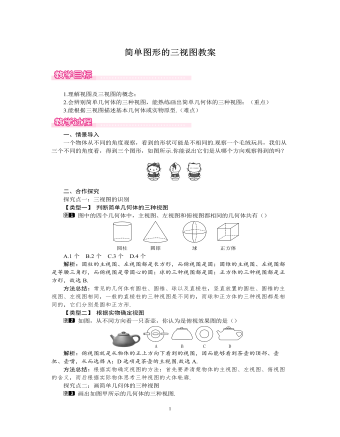
北师大初中数学九年级上册简单图形的三视图1教案
故最少由9个小立方体搭成,最多由11个小立方体搭成;(3)左视图如右图所示.方法点拨:这类问题一般是给出一个由相同的小正方体搭成的立体图形的两种视图,要求想象出这个几何体可能的形状.解答时可以先由三种视图描述出对应的该物体,再由此得出组成该物体的部分个体的个数.三、板书设计视图概念:用正投影的方法绘制的物体在投影 面上的图形三视图的组成主视图:从正面得到的视图左视图:从左面得到的视图俯视图:从上面得到的视图三视图的画法:长对正,高平齐,宽相等由三视图推断原几何体的形状通过观察、操作、猜想、讨论、合作等活动,使学生体会到三视图中位置及各部分之间大小的对应关系.通过具体活动,积累学生的观察、想象物体投影的经验,发展学生的动手实践能力、数学思考能力和空间观念.
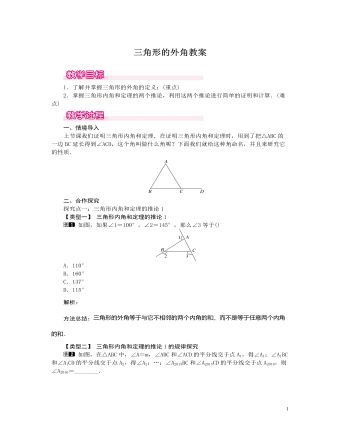
北师大初中数学八年级上册三角形的外角1教案
探究点二:三角形内角和定理的推论2如图,P是△ABC内的一点,求证:∠BPC>∠A.解析:由题意无法直接得出∠BPC>∠A,延长BP交AC于D,就能得到∠BPC>∠PDC,∠PDC>∠A.即可得证.证明:延长BP交AC于D,∵∠BPC是△ABC的外角(外角定义),∴∠BPC>∠PDC(三角形的一个外角大于任何一个和它不相邻的内角).同理可证:∠PDC>∠A,∴∠BPC>∠A.方法总结:利用推论2证明角的大小时,两个角应是同一个三角形的内角和外角.若不是,就需借助中间量转化求证.三、板书设计三角形的外角外角:三角形的一边与另一边的延长线所组成的 角,叫做三角形的外角推论1:三角形的一个外角等于和它不相邻的两 个内角的和推论2:三角形的一个外角大于任何一个和它不 相邻的内角利用已经学过的知识来推导出新的定理以及运用新的定理解决相关问题,进一步熟悉和掌握证明的步骤、格式、方法、技巧.进一步培养学生的逻辑思维能力和推理能力,特别是培养有条理的想象和探索能力,从而做到强化基础,激发学习兴趣.
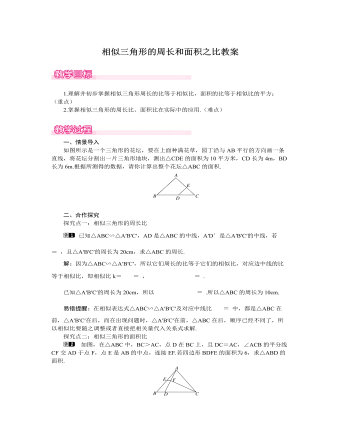
北师大初中数学九年级上册相似三角形的周长和面积之比1教案
解:∵CF平分∠ACB,DC=AC,∴CF是△ACD的中线,即F是AD的中点.∵点E是AB的中点,∴EF∥BD,且EFBD=12.∴∠B=∠AEF,∠ADB=∠AFE,∴△AEF∽△ABD.∴S△AEFS△ABD=(12)2=14.∵S△AEF=S△ABD-S四边形BDFE=S△ABD-6,∴S△ABD-6S△ABD=14.∴S△ABD=8,即△ABD的面积为8.易错提醒:在运用“相似三角形的面积比等于相似比的平方”这一性质时,同样要注意是对应三角形的面积比,在本题中不要犯由EF:BD=1:2得S△AEF:S△ABD=1:2,或S△AEF:S四边形BDFE=1:2之类的错误.三、板书设计相似三角形的周长和面积之比:相似三角形的周长比等于相似比,面积比等于相似比的平方.经历相似三角形的性质的探索过程,培养学生的探索能力.通过交流、归纳,总结相似三角形的周长比、面积比与相似比的关系,体验化归思想.运用相似多边形的周长比,面积比解决实际问题,训练学生的运用能力,增强学生对知识的应用意识.
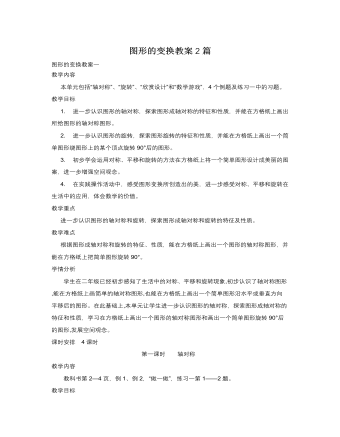
人教版新课标小学数学五年级下册图形的变换教案2篇
师:从图1到图2,风车发生了怎样的变化呢?下面请同学们小组合作,共同来解决报告单上提出的问题。(1)从图1到图2,风车绕点O逆时针旋转了___度。(2)你是怎样判断风车旋转的角度的?生小组讨论。3.小组汇报(实物投影展示)(1)图1到图2,风车绕点O逆时针旋转了90°;(2)组1,根据三角形变换的位置判断风车旋转的角度;(3)组2,根据对应的线段判断风车旋转的角度;(4)组3,根据对应的点判断风车旋转的角度。4.小结(教师边做小结边演示)师:通过观察,我们发现风车旋转后,不仅是每个三角形都绕点O逆时针旋转了90°(闪烁),而且,每条线段(闪烁),每个顶点(闪烁),都绕点O逆时针旋转了90°。5.揭示旋转的特征和性质

能干的小手中班教案中班社会能干的我教案
1、谈话导入,激发兴趣。 师:小朋友,每个人都有自己的兴趣爱好,老师也有自己的兴趣和爱好,你能猜猜是什么爱好吗? 生:自由发言 师:我想小朋友也都有自己的兴趣爱好,谁愿意告诉大家呢? 生:幼儿各自说出自己的兴趣爱好。 2、师幼相互分享自己的兴趣爱好。A幼儿展示自己的兴趣爱好。 B教师展示兴趣爱好。 3、闯关 闯关游戏一:我是小小主持人
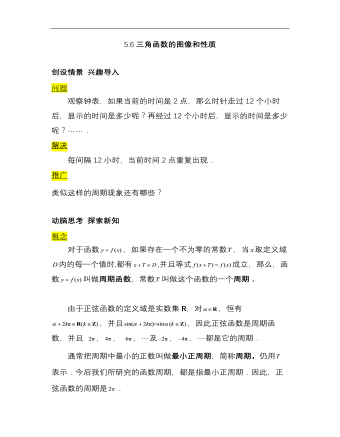
【高教版】中职数学基础模块上册:5.6《三角函数的图像和性质》优秀教案
创设情景 兴趣导入问题 观察钟表,如果当前的时间是2点,那么时针走过12个小时后,显示的时间是多少呢?再经过12个小时后,显示的时间是多少呢?.解决每间隔12小时,当前时间2点重复出现.推广类似这样的周期现象还有哪些? 动脑思考 探索新知概念 对于函数,如果存在一个不为零的常数,当取定义域内的每一个值时,都有,并且等式成立,那么,函数叫做周期函数,常数叫做这个函数的一个周期. 由于正弦函数的定义域是实数集R,对,恒有,并且,因此正弦函数是周期函数,并且 ,, ,及,,都是它的周期.通常把周期中最小的正数叫做最小正周期,简称周期,仍用表示.今后我们所研究的函数周期,都是指最小正周期.因此,正弦函数的周期是.
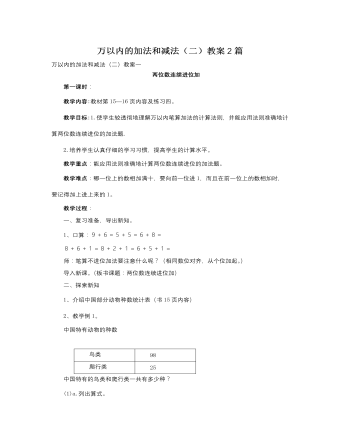
人教版新课标小学数学三年级上册万以内的加法和减法(二)教案2篇
●教学内容:教科书第27页的内容。●教学目标:①通过创设具体的情境,使学生初步学会加法的验算,并通过加法验算方法的交流、让学生体会算法的多样化。②培养学生探索合作交流的意识和能力。③让学生用所学到的验算知识去解决生活中的问题,体会用数学的乐趣。●教具准备:老师准备挂图或课件。●教学过程:创设情境、导入新课。师:同学们,你们与爸爸、妈妈去超市买过东西吗?生:互相说说,再请同学发表意见。师:(挂图1)我们来看挂图,小明和妈妈去超市买东西,从图1中你看到了什么?生1:从图1中我看到了小明妈妈买了一套135元的运动服和一双48元的运动鞋。生2:从图1中我看到小明妈妈给了售货员200元。生3:要知道一套运动服和一双运动鞋一共要多少元?应用加法计算。师:全班动手计算。板书:135+48=183(元)
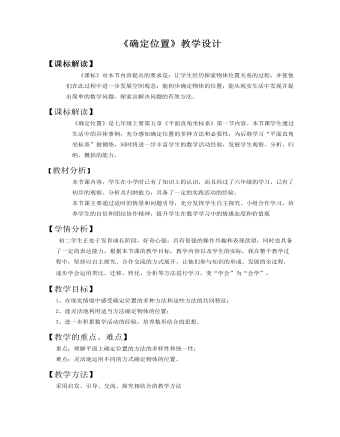
初中数学鲁教版七年级上册《第五章 位置与坐标 1 确定位置》教学设计教案
1、通过同位之间互说座位位置,检测知识目标2、3的达成效果。2、通过导学案上的探究一,检测知识目标2、3的达成效果。 3、通过探究二,检测知识目标1、3的达成效果。 4、通过课堂反馈,检测总体教学目标的达成效果。本节课遵循分层施教的原则,以适应不同学生的发展与提高,针对学生回答问题本着多鼓励、少批评的原则,具体从以下几方面进行评价:1、通过学生独立思考、参与小组交流和班级集体展示,教师课堂观察学生的表现,了解学生对知识的理解和掌握情况。教师进行适时的反应评价,同时促进学生的自评与互评。2、通过设计课堂互说座位、探究一、二及达标检测题,检测学习目标达成情况,同时有利于学生完成对自己的评价。3.通过课后作业,了解学生对本课时知识的掌握情况,同时又能检测学生分析解决问题的方法和思路,完成教学反馈评价。
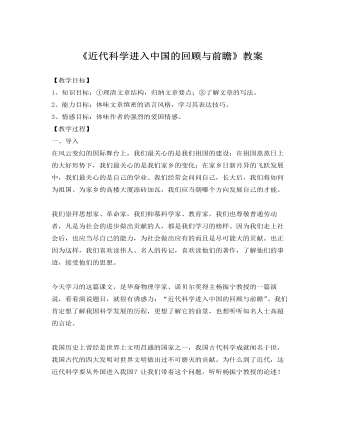
人教版高中语文《近代科学进入中国的回顾与前瞻》教案
七、联系实际·拓展延伸看云起云飞——交流对我国现代科技发展转机的看法甲生说:本文作者把成立京师大学堂、废除科举、派遣留学生看作三件有划时代意义的大事,是很有见地的。京师大学堂是戊戌变法的产物,是北京大学的前身,是我国第一次设立的大学,所教东西比较全面,包括了现代的科学。这表明,国人已经从先前的自大、愚昧的精神状态中转过弯来。先前不少人把西方科技看作是雕虫小技,而认为我们才是正宗的。这是狂妄自大。又有一些人走到另一个极端去,产生了什么“种族退代论”,这是自卑感在作怪。成立京师大学堂,标志着国人的认识产生了根本的变化。我们对西方科技有了正确的认识,看到科技在国计民生中起的重要作用,克服了自大缺点。我们又重新树立了信心,认识到,改革教育、办好学校,我们也同样能够培养出一批优秀的科技人才,同样可以发展科技,借以富民强国,这就克服了自卑感。
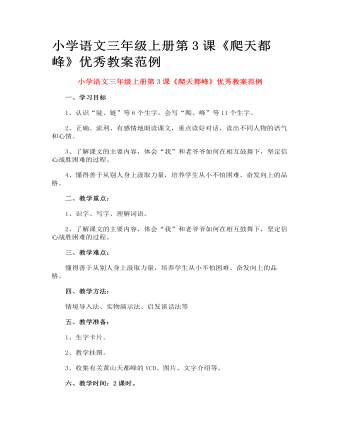
小学语文三年级上册第3课《爬天都峰》优秀教案范例
深入读议,体会“我”受鼓舞爬上峰顶 1、在爬山之前,望着又高又陡的天都峰,“我”心里是怎么想的?默读课文,圈点勾画,想想从哪些词语、句子中看出“我”有害怕畏惧的心理。 指名交流,出示并指导读好问句“我爬得上去吗?”、感叹句“真叫人发颤!”以及语气词“啊”“哩”等,读中体会“我”缺乏自信、畏惧退缩的心理。 2、结果“我”爬上峰顶了吗?自由读课文的第8至10自然段,出示“我”说的话,指名朗读。 3、“我”看到了什么从而下定决心爬上峰顶呢?自由读课文第3到7自然段,想想我的心理发生了怎样的变化。 a. 出示第4段重点句,引导学生深入讨论交流,从中感受到“我”受老爷爷爬山鼓励而下定决心爬上峰顶的内心活动。 b. 体会“我”的心理,指导朗读3、4自然段。 4、“我”是怎么爬的?自由读6、7自然段,画出描写爬山动作的词语。 a. 学生读书圈划。 b.学生交流。引导学生联系上下文,体会“奋力”是拼尽全身力气的意思。 从“攀着铁链”、“手脚并用向上爬”可以看出爬山的艰难。 c.引读第7段,从“终于”二字上体会爬得辛苦、上山后的喜悦。 d. 体会爬山的艰难、上山后的喜悦,指导朗读6、7两段。
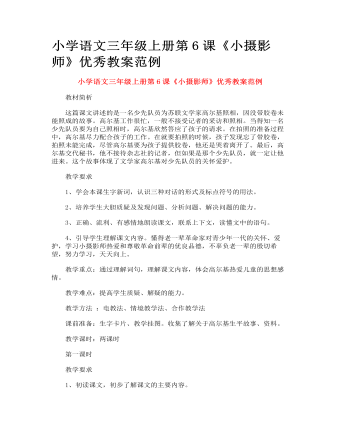
小学语文三年级上册第6课《小摄影师》优秀教案范例
介绍人物,导入新课 1、启发谈话。课前同学们自己已经读过了课文,查阅了有关资料,谁能向大家介绍一下高尔基? 2、学生之间交流收集的有关高尔基的资料。 3、师出示高尔基的画像,并归纳:高尔基(1886年~1936年),是苏联伟大的无产阶级文学家,世界著名的文学家。他写了很多书,发表了《童年》、《在人间》、《我的大学》、《母亲》等多部小说以及著名的散文诗《海燕》和一系列剧本。“书籍是人类进步的阶梯”这句脍炙人口的名言,就出自高尔基的笔下,全世界人民都很敬爱他。他的作品在我国广为流传,得到人们的喜爱。今天,我们来学习高尔基与一位小学生之间的故事:小摄影师。(板书,提示“摄”的读音。) 高尔基与小摄影师之间到底发生了什么事呢?我们下面来看课文
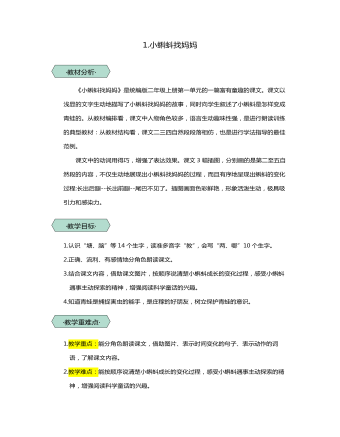
统编版二年级语文上第1课小蝌蚪找妈妈教学设计教案
《小蝌蚪找妈妈》是统编版二年级上册第一单元的一篇富有童趣的课文。课文以浅显的文字生动地描写了小蝌蚪找妈妈的故事,同时向学生叙述了小蝌蚪是怎样变成青蛙的。从教材编排看,课文中人物角色较多,语言生动趣味性强,是进行朗读训练的典型教材:从教材结构看,课文二三四自然段段落相仿,也是进行学法指导的最佳范例。课文中的动词用得巧,增强了表达效果。课文3幅插图,分别画的是第二至五自然段的内容,不仅生动地展现出小蝌蚪找妈妈的过程,而且有序地呈现出蝌蚪的变化过程:长出后腿--长出前腿--尾巴不见了。插图画面色彩鲜艳,形象活泼生动,极具吸引力和感染力。 1.认识“塘、脑”等14个生字,读准多音字“教”,会写“两、哪”10个生字。2.正确、流利、有感情地分角色朗读课文。3.结合课文内容,借助课文图片,按顺序说清楚小蝌蚪成长的变化过程,感受小蝌蚪遇事主动探索的精神,增强阅读科学童话的兴趣。4.知道青蛙是捕捉害虫的能手,是庄稼的好朋友,树立保护青蛙的意识。 1.教学重点:能分角色朗读课文,借助图片、表示时间变化的句子、表示动作的词语,了解课文内容。2.教学难点:能按顺序说清楚小蝌蚪成长的变化过程,感受小蝌蚪遇事主动探索的精神,增强阅读科学童话的兴趣。 2课时
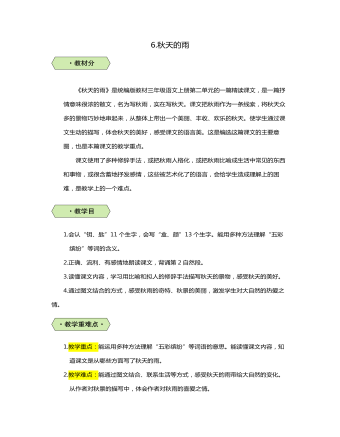
秋天的雨教案
《秋天的雨》是统编版教材三年级语文上册第二单元的一篇精读课文,是一篇抒情意味很浓的散文,名为写秋雨,实在写秋天。课文把秋雨作为一条线索,将秋天众多的景物巧妙地串起来,从整体上带出一个美丽、丰收、欢乐的秋天。使学生通过课文生动的描写,体会秋天的美好,感受课文的语言美。这是编选这篇课文的主要意图,也是本篇课文的教学重点。课文使用了多种修辞手法,或把秋雨人格化,或把秋雨比喻成生活中常见的东西和事物,或很含蓄地抒发感情,这些被艺术化了的语言,会给学生造成理解上的困难,是教学上的一个难点。
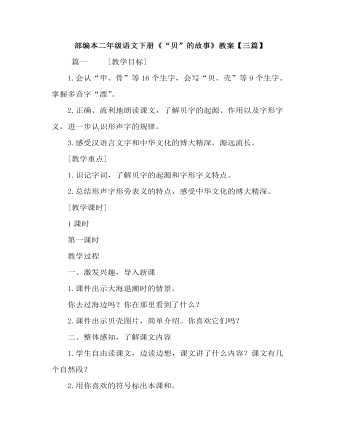
《“贝”的故事》教案
教学目标: 1、会认“甲、骨、类”等16个生字,会写“贴、街、扫”等9个生字,会写“贝壳、甲骨文、样子、可以、钱币、钱财、有关”等词语, 2、默读课文,了解贝字的起源,贝的作用以及字形字义。 一、激趣引入。 1、观察,说说你的发现。 (1)流、泪、河、江(2)说、话、记、读 (3)树、杨、李、林(4)购、货、赠、赚 2、说说你的发现。 生1:第一组的字都是“氵”,三点水的字都与水有关。 生2:第二组的字都是“讠”,言字旁的字都与说话有关。 生3:第三组的字都是“木”,木字旁的字都与树木有关。 生4:第四组的字都是“贝”,贝字旁的字都与钱有关。 3、师:孩子们真聪明,观察得非常仔细。今天,我们就要学习一篇与贝有关的课文。 4、揭示课题:3、贝的故事。
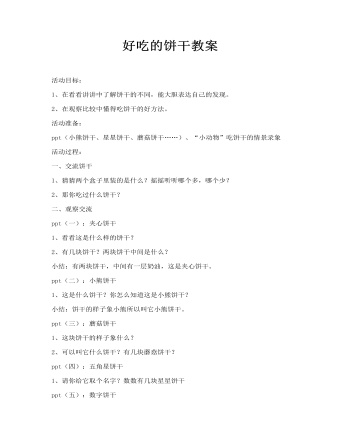
好吃的饼干教案
一、交流饼干1、猜猜两个盒子里装的是什么?摇摇听听哪个多,哪个少?2、那你吃过什么饼干?二、观察交流ppt(一):夹心饼干1、看看这是什么样的饼干?2、有几块饼干?两块饼干中间是什么?小结:有两块饼干,中间有一层奶油,这是夹心饼干。
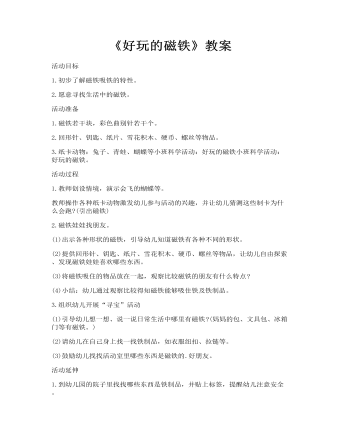
《好玩的磁铁》教案
1.教师创设情境,演示会飞的蝴蝶等。教师操作各种纸卡动物激发幼儿参与活动的兴趣,并让幼儿猜测这些制卡为什么会跑?(引出磁铁)2.磁铁娃娃找朋友。(1)出示各种形状的磁铁,引导幼儿知道磁铁有各种不同的形状。(2)提供回形针、钥匙、纸片、雪花积木、硬币、螺丝等物品,让幼儿自由探索、发现磁铁娃娃喜欢哪些东西。(3)将磁铁吸住的物品放在一起,观察比较磁铁的朋友有什么特点?
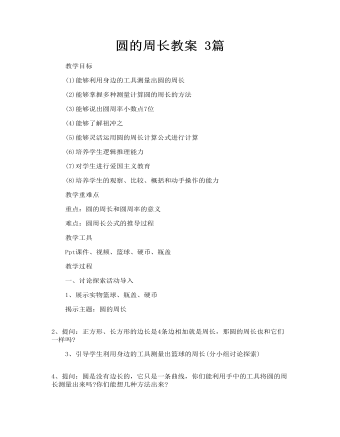
圆的周长教案 3篇
一、讨论探索活动导入 1、展示实物篮球、瓶盖、硬币 揭示主题:圆的周长 2、提问:正方形、长方形的边长是4条边相加就是周长,那圆的周长也和它们一样吗? 3、引导学生利用身边的工具测量出篮球的周长(分小组讨论探索) 4、提问:圆是没有边长的,它只是一条曲线,你们能利用手中的工具将圆的周长测量出来吗?你们能想几种方法出来?
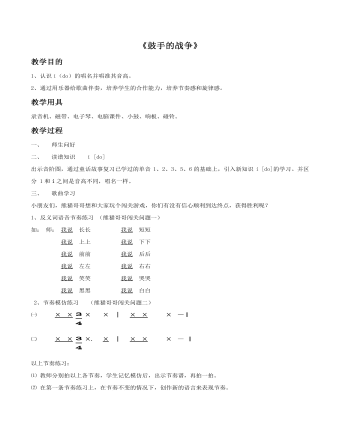
《鼓手的战争》教案
发声练习 ⑴根据以上节奏出示旋律。⑵师生一起识谱。⑶学生跟琴用“啦”模唱第二条旋律。⑷学生跟琴视唱谱。歌唱学习 ⑴范听第一遍,比比谁的耳朵灵。提问:a、 听听歌曲中使用了什么打击乐器? (小鼓) b、 歌曲讲了一个什么故事?⑵范听第二遍提问:你认为应该用什么情绪演唱?你能给这首歌取个名字吗?⑶出示歌谱,并给歌曲分句,请学生找出节奏相同的地方,再范听一遍。⑷有感情,有节奏的朗读歌词。(边拍边读)⑸学唱歌曲
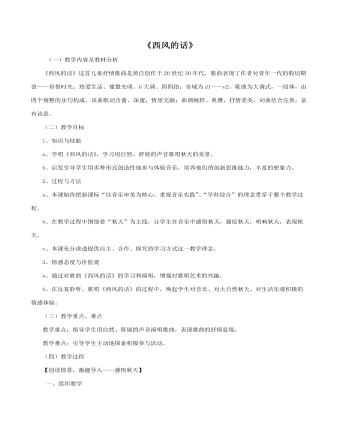
《西风的话》教案
(一)教学内容及教材分析《西风的话》这首儿童抒情歌曲是黄自创作于20世纪30年代,歌曲表现了作者对青年一代的殷切期望——珍惜时光、热爱生活、憧憬光明。G大调、四四拍;音域为d1——e2。歌曲为大调式,一段体,由四个规整的乐句构成。该曲歌词含蓄、深邃,情景交融;曲调婉转、典雅,抒情柔美,词曲结合完善,富有诗意。(二)教学目标1、知识与技能a、学唱《西风的话》,学习用自然、舒展的声音歌唱秋天的美景。b、启发引导学生用多种形式创造性地参与体验音乐,培养他们的创新思维能力,丰富的想象力。2、过程与方法a、本课始终把新课标“以音乐审美为核心,重视音乐实践”、“学科综合”的理念贯穿于整个教学过程。b、在教学过程中围绕着“秋天”为主线,让学生在音乐中感悟秋天,描绘秋天,唱响秋天,表现秋天。c、本课充分渗透提供自主、合作、探究的学习方式这一教学理念。
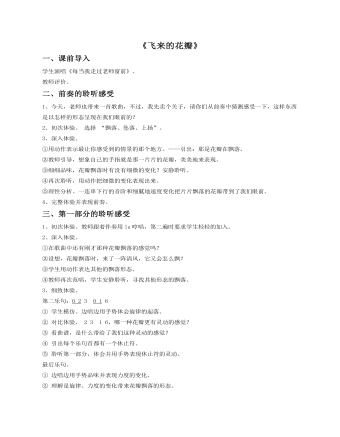
《飞来的花瓣》教案
聆听感悟第二乐段1、B段情感的推动体验。①设问:第二部分激动的情绪是怎么推上去的?找到音的最高点,高音2②品味前2句的旋律推进美感。教师哼唱曲谱,请学生关注每一句的句首音和句尾音。第一句:5到3,第二句 5到5,第三句3 到高音2。品味第三句首回落的情绪美感。对比,有回落和无回落的不同推进感。③聆听前2句,教师引导学生用手势表现旋律的起伏变化。2、体验情感的爆发点:“三个回答”①教师自然地用歌声接上前面的聆听。并分析强拍起音带来的情感爆发。②学生自由表现“三个回答”。师:同学们,请你想想平时老师对你的关爱,对你的叮咛,一定有很多令你感动的小情节吧!(闭起眼睛默默想10秒)所有的记忆,所有的感激,所有的深情在这里化成一次又一次“回答老师”。你会用怎么样的力度处理来表现这三个重复的回答老师,表达自己的感激之情。





















